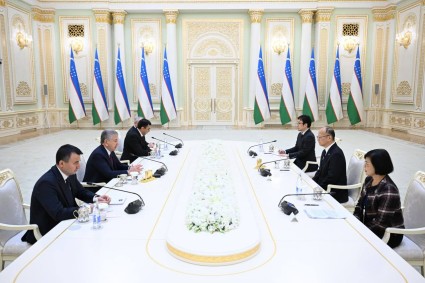The Executive Board of the International Monetary Fund (IMF) concluded the Article IV consultation with the Republic of Uzbekistan. Despite shocks from the pandemic and the war in Ukraine, Uzbekistan's economy has shown resilience. The pandemic caused a sharp slowdown in 2020, particularly in trade, tourism, and transportation. Nonetheless, real growth remained positive at 1.9 percent. Year-end inflation fell to 11 percent.
In 2021, helped by government stimulus measures, growth rebounded sharply to 7.4 percent. Despite global price pressures, tight monetary policy helped reduce inflation further to 10 percent by end-2021. With a recovery in trade and remittances, the current account deficit widened slightly to 7 percent of GDP. Government economic support in the form of social assistance, investment and policy lending widened the overall fiscal deficit by 2 percentage points to 6.2 percent of GDP.
Despite these shocks, the authorities continued to make progress on structural reforms. Recent reforms included: liberalizing domestic prices and reducing crop placement requirements for cotton and wheat; making public procurement more transparent through a public portal that also collects information on beneficial owners; doubling the size of the social safety net; improving corporate governance by appointing more independent members of supervisory boards; selling a mid-sized state enterprise and many smaller assets; and finalizing laws on public debt and the labor market.
Given Uzbekistan's close economic ties with Russia, the outlook for 2022 will depend upon spillovers from the war in Ukraine and sanctions on Russia. Remittances, trade, and financing from Russia are expected to slow, reducing growth in 2022 to 3-4 percent and increasing the current account deficit to 8% percent. With higher global food and commodity prices, inflation is expected to remain over 10 percent. Uncertainty is high, however. Possible risks could arise from a further escalation of the war and the sanctions regime, a renewed flare-up of the pandemic, slower growth in other trading partners, higher food and energy prices, or lower gold prices.
The authorities' macro-economic policies in the near term are focused on mitigating the impact of the shock, by supporting the recovery, protecting vulnerable households, containing inflation, and safeguarding financial stability. At the same time, they intend to accelerate the pace of structural reforms to ensure strong, sustainable, and inclusive longer-term growth, while enhancing resilience. Building on the progress already made, their efforts are focused on reducing the role of the state in the economy and creating an environment conducive to private sector job creation, by further opening up markets and enhancing competition.
Executive Board Assessment
Executive Directors commended Uzbekistan's authorities for their decisive policy response to the COVID-19 pandemic, which contributed to a strong economic recovery in 2021. Directors noted, however, that the spillovers from the war in Ukraine are slowing growth and, together with a possible resurgence of the pandemic, create significant uncertainty to the outlook. Against this backdrop, they welcomed the authorities' continued commitment to sound macroeconomic policies and structural reforms, which are critical to ensuring macroeconomic stability and promoting inclusive growth.
Directors commended the authorities' commitment to fiscal sustainability. They agreed that fiscal consolidation could be slowed this year, relative to the approved budget, to provide additional, targeted support to vulnerable households, particularly given the low risk of debt distress. Directors welcomed the authorities' plans for a gradual fiscal consolidation in the coming years, the introduction of medium-term fiscal and revenue frameworks, and the strengthening of the fiscal rules. They emphasized the need to continue enhancing revenue collection and spending efficiency, while addressing potential fiscal risks from state-owned enterprises (SOEs).
Directors welcomed the central bank's prompt monetary policy tightening in early 2022 and its commitment to lower inflation, which are key to anchor expectations and achieve the medium-term inflation target. They emphasized the need for continued exchange rate flexibility to mitigate spillovers from external shocks. Directors supported the plans to reduce the role of state-owned banks in the financial system, which should also help strengthen the transmission of monetary policy. To safeguard financial stability, they recommended strengthening the central bank's supervisory and macroprudential frameworks, while continuing to closely monitor banks. They encouraged the authorities to continue implementing their AML/CFT strategy, including working on a new AML/CFT law.
Directors commended the authorities' reform progress and called for accelerating structural reforms. They particularly welcomed the measures to reduce the role of the state in the economy, by privatizing state-owned banks and SOEs, opening markets to private businesses, and enhancing competition and governance. In this context, Directors stressed the importance of ongoing governance reforms, including strengthening anticorruption institutions and corporate governance of SOEs. They also welcomed the plans to reform the energy sector, which is key to reduce the economy's energy intensity and carbon emissions.











